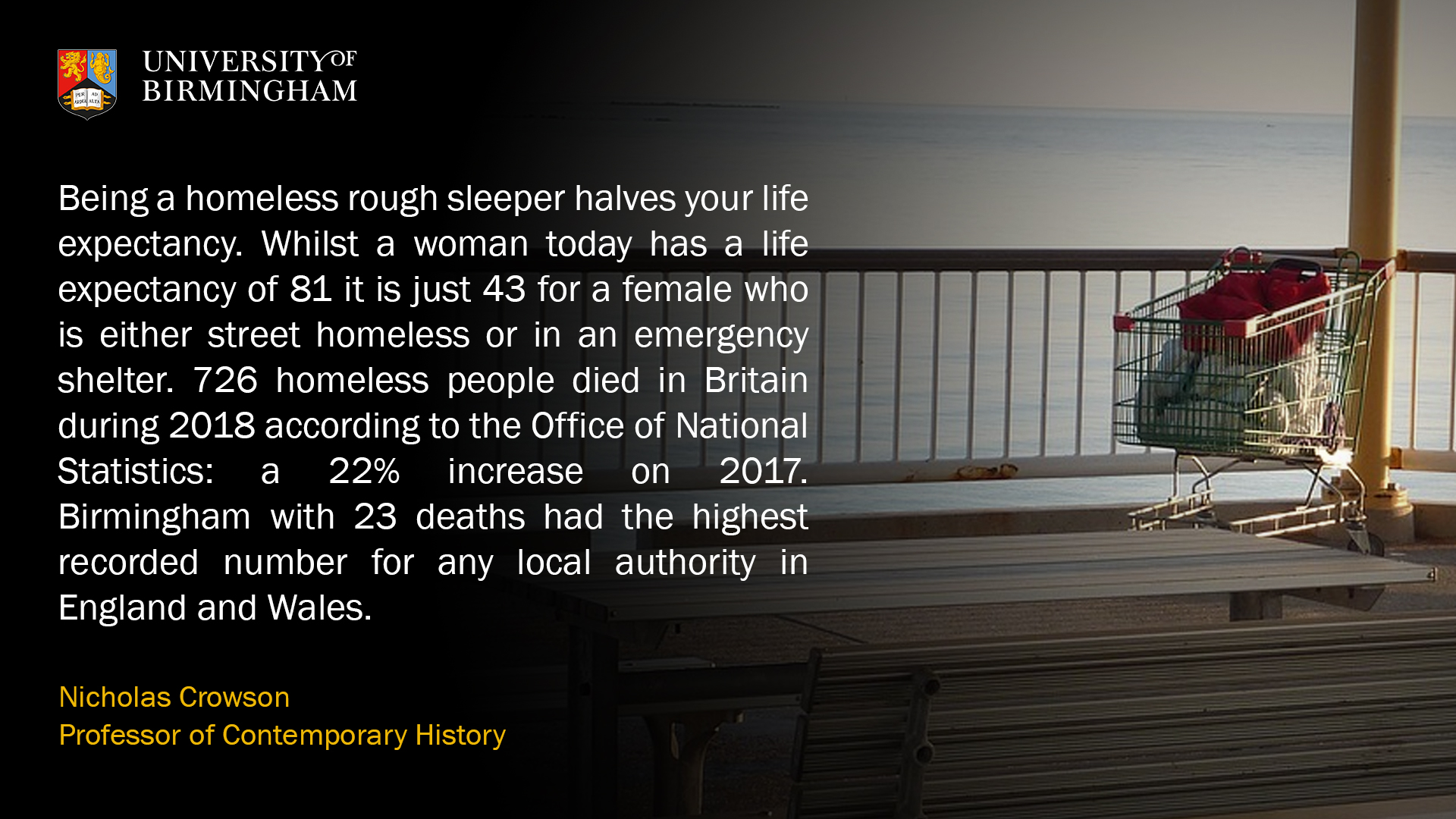At least 726 homeless people died in Britain last year, according to new figures released by the ONS. If you’re a homeless person, your average life expectancy is just 44 years old. In England alone, the number of rough sleepers has increased by 165% since 2010. Whichever way you look at it, the statistics around homelessness are truly shocking.
Cities like Birmingham have been particularly affected, with official figures showing 23 deaths in 2018, the highest recorded number for any local authority in England and Wales. Despite this, there’s a clear recognition that something must be done.
Mayor of the West Midlands Andy Street set up a Homelessness Task Force in 2017 in a bid to ‘design out’ homelessness in the region. Meanwhile, grassroots initiatives like Let’s Feed Brum have seen ordinary people give up their time to help those most in need.
But as the latest national and local figures show, we still have a way to go. So this year, to mark World Homeless Day on 10 October, we decided to convene a roundtable event at the University of Birmingham to get people talking about the key issues around homelessness.
We brought together academics with local authorities, medical practitioners and support workers and asked them to consider what can be done to reduce homelessness and improve people’s quality of life.
Here’s what they said.
What’s driving homelessness?
At the heart of the problem lies the fact that the system is letting people down. Austerity has led to the social security threads being snipped away, so that when vulnerable people’s shallow support networks fail, they fall through the cracks, unable to access the support they need.
On the one hand, public spending cutbacks have meant that prevention services – particularly around mental health and substance misuse – and economic regeneration schemes have suffered and this has fuelled the rise in homeless numbers.
We’re now talking about managing a crisis rather than making progress on tackling the serious underlying issues that lead to homelessness.
On the other hand, the welfare system has been tightened so that it is harder than ever before for people to access the support they need.
The government’s radical agenda around austerity and tightening the welfare system have damaged the safety net for vulnerable people. As a result, we’re now talking about managing a crisis rather than making progress on tackling the serious underlying issues that lead to homelessness.
Interventions such as mental skills training (such as the MST4Life™ programme developed by Dr Jennifer Cumming in partnership with St Basils) to help homeless and at-risk people develop their resilience can make a real difference.
The lack of affordable housing is another big factor. As housing costs rise and welfare payments are restricted, more people are finding that they simply do not have enough money to support their housing needs.
Some key challenges
Healthcare practitioners report a marked decline in the overall health of homeless people in recent years. Cases of hepatitis C, HIV and sepsis are rising and more patients are having limbs amputated. Medical professionals report having to perform resuscitations on an almost daily basis. What’s more, a recent study co-authored by Dr Vibhu Paudyal found that homeless people are 60 times more likely to visit A&E compared with the general public.
Attitudes towards homeless people have shifted in recent decades. In the 1970s, there was an emphasis on providing vulnerable people with good and affordable homes in places where you could bring up a family and find work. We have gone from that to a short term social subsidy that is only available to the ‘deserving’ poor.

As a society, we have regressed in terms of what we are willing to accept. A roof over people’s heads is not good enough; people need to have a home where they feel safe, secure and connected to a community.
Tackling public concerns about bogus homeless people and the political rhetoric around the ‘scrounger’ must form part of any kind of response, noted Professor Nicholas Crowson. We should avoid stigmatising homeless people as ‘passive, alien, dehumanised or diseased’.
What should be done?
There need to be serious policy changes at the national level to enable support workers to tackle the underlying issues that are forcing people into homelessness.
Government should:
- Put more money into prevention services and long-term initiatives.
- Review the welfare system to ensure that people receive the support they need.
- Allow cities to trial drug consumption rooms to see if this could reduce drug-related deaths and make our streets safer.
- Bring down housing costs and increase the number of affordable homes.
Parliament should:
- Repeal the Vagrancy Act 1824, an outdated law that needlessly criminalises beggars.
Birmingham should:
- Use the 2022 Commonwealth Games, which will be held in the city, to inspire social change. The authorities should avoid using measures such as Public Space Protection Orders (PSPOs) to clear the homeless from the streets. Instead we should take this opportunity to show the world how to tackle complex social issues in a positive way, using sport and the legacy of the Games as a catalyst.
Find out more
You can download a summary of the roundtable discussion from our website.

